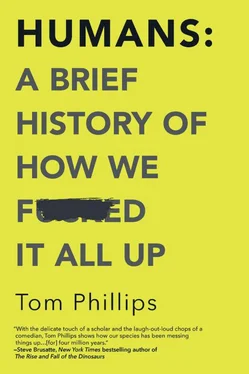Tom Phillips - Humans - A Brief History of How We F*cked It All Up
Здесь есть возможность читать онлайн «Tom Phillips - Humans - A Brief History of How We F*cked It All Up» весь текст электронной книги совершенно бесплатно (целиком полную версию без сокращений). В некоторых случаях можно слушать аудио, скачать через торрент в формате fb2 и присутствует краткое содержание. Город: Toronto, Год выпуска: 2019, ISBN: 2019, Издательство: Hanover Square Press, Жанр: История, Юмористические книги, на английском языке. Описание произведения, (предисловие) а так же отзывы посетителей доступны на портале библиотеки ЛибКат.
- Название:Humans: A Brief History of How We F*cked It All Up
- Автор:
- Издательство:Hanover Square Press
- Жанр:
- Год:2019
- Город:Toronto
- ISBN:978-1-48805-113-5
- Рейтинг книги:4 / 5. Голосов: 1
-
Избранное:Добавить в избранное
- Отзывы:
-
Ваша оценка:
- 80
- 1
- 2
- 3
- 4
- 5
Humans: A Brief History of How We F*cked It All Up: краткое содержание, описание и аннотация
Предлагаем к чтению аннотацию, описание, краткое содержание или предисловие (зависит от того, что написал сам автор книги «Humans: A Brief History of How We F*cked It All Up»). Если вы не нашли необходимую информацию о книге — напишите в комментариях, мы постараемся отыскать её.
Humans: A Brief History of How We F*cked It All Up — читать онлайн бесплатно полную книгу (весь текст) целиком
Ниже представлен текст книги, разбитый по страницам. Система сохранения места последней прочитанной страницы, позволяет с удобством читать онлайн бесплатно книгу «Humans: A Brief History of How We F*cked It All Up», без необходимости каждый раз заново искать на чём Вы остановились. Поставьте закладку, и сможете в любой момент перейти на страницу, на которой закончили чтение.
Интервал:
Закладка:
Or maybe we’ll just blow ourselves up in a nuclear war before any of this happens.
Or perhaps the fuck-up won’t be as dramatic as that. Maybe we’ll just quietly doom ourselves to a crappy future through our own laziness. Ever since we slipped the surly bonds of earth and entered the space age, our approach to stuff we don’t need anymore in space has been pretty much the same as our approach to all the other rubbish we create: we just throw it away. Space is very big, after all, so how much would it matter?
That’s where Kessler syndrome comes in. This was predicted by NASA scientist Donald Kessler way back in 1978, and yet it hasn’t stopped us chucking stuff away in space. The problem is that when you dump things in orbit, they don’t really go anywhere. It’s not like throwing a potato chip bag out of a car window, to be immediately forgotten about—space rubbish stays orbiting at roughly the same speed and on the same trajectory as the thing it was thrown out of. And sometimes it will collide with other bits of junk.
The trouble with that is that, because of the speed objects in orbit are moving at, a collision becomes incredibly destructive. A single collision with the smallest piece of material can be catastrophic, destroying satellites or space stations. And those deadly collisions produce, that’s right, thousands upon thousands more pieces of space junk, all of which can cause more collisions. This is what Donald Kessler predicted: that eventually space will become so crowded that this process will reach a tipping point, where each collision creates more and more collisions, until our planet is surrounded by an all-enveloping cloud of high-velocity garbage missiles. The result of this: satellites become useless, and launching into space becomes a deadly risk. We could become, effectively, earthbound.
In some ways, it feels like it would be a weirdly poetic end to the journey that Lucy failed to begin all those millions of years ago. All that exploration, all that progress, all those dreams and grand notions, and that’s where we end up: trapped on our planet by a prison we’ve made from our own trash.
Whatever our future holds, whatever baffling changes come along in the next year, the next decade and the next century, it seems likely that we’ll keep on doing basically the same things. We will blame other people for our woes, and construct elaborate fantasy worlds so that we don’t have to think about our sins. We will turn to populist leaders in the aftermath of economic crises. We will scramble for money. We will succumb to groupthink and manias and confirmation bias. We will tell ourselves that our plans are very good plans and that nothing can possibly go wrong.
Or… maybe we won’t? Maybe this is the moment that we change, and start learning from our history. Maybe all this is just being pessimistic, and no matter how dumb and depressing the world today may sometimes seem, in actuality humanity is getting wiser and more enlightened, and we are lucky enough to live at the dawn of a new age of not fucking up. Maybe we really do have the capacity to be better.
One day, perhaps, we’ll climb up a tree and not fall out.

ACKNOWLEDGMENTS
I couldn’t have written this book without the help of a lot of people. My thanks in the first place must go to my agent Antony Topping, without whom I would very literally never have written it. Alex Clarke, Kate Stephenson, Ella Gordon, Becky Hunter, Robert Chilver and the whole team at Headline were a delight to work with, and I’m very sorry about the deadlines. I’d also like to thank Will Moy and the wonderful people of Full Fact for, among other things, waiting too long.
My family—my parents, Don and Colette, and my actual proper historian brother, Ben—were supportive throughout. Hannah Jewell provided funny history book inspiration, insight and a shared understanding of ghosts. Kate Arkless-Gray offered canny advice, a sympathetic ear and also, crucially, a really cracking housesitting opportunity. Maha Atal and Chris Applegate offered stimulating discussion and numerous suggestions; Nicky Reeves likewise. I also have to thank the historians of Twitter for being reliably great and supportive—in particular Greg Jenner (who I loosely paraphrase on page 9) and Fern Riddell; please buy their books, too. Just going to keep adding people now to make it look like I have lots of friends. Damian and Holly Kahya, James Ball, Rose Buchanan, Amna Saleem and many others provided wise words and pints. Bumping into Kelly Oakes repeatedly while in the final stages of writing was exactly the motivation I needed to keep going. I’d also like to thank Tom Chivers for the lunch we never had, sorry about that. The band CHVRCHES released a strong album during the writing process; I include them in this section merely in the hope that someone will distractedly skim it for names but not really take in the context, and as such will think my life is a lot more glamorous than it seems. On that basis, my thanks also to Beyoncé, Cate Blanchett and Ghost David Bowie.
It goes without saying that any failures in this book are mine alone, and do not reflect on any of them. Except for Ghost David Bowie.
FURTHER READING
There are a number of books that I want to acknowledge that I leaned on particularly heavily for certain sections of the book. (Some are already referenced in the text.) All of them are well worth reading for a deeper dive into some of the issues and events that the space in this book only allowed me to touch on.
Daniel Kahneman’s Thinking, Fast and Slow is mentioned in the section on cognitive weirdnesses, and underpins a lot of our understanding of how our minds operate. Meanwhile Robert E. Bartholomew’s A Colorful History of Popular Delusions is a great read on manias, crazes, fads and panics.
Jared Diamond’s Collapse is also mentioned in the text, and heavily informed the section on Easter Island (moreover his influence is clear throughout that whole section).
Volker Ullrich’s Hitler: Volume I: Ascent 1889–1939 was a source for much of the Hitler material (and fans of elegant literary subtweets will also recognize the central conceit of Michiko Kakutani’s spectacular review of the same book).
Another one that’s referenced a couple of times in the text is Douglas Watt’s The Price of Scotland: Darien, Union and the Wealth of Nations , which is an insightful and meticulous unpicking of William Paterson’s folly.
Frank McLynn’s Genghis Khan: The Man Who Conquered the World and Jack Weatherford’s Genghis Khan and the Making of the Modern World were important for the Khwarezm section.
I also want to shout out a pair of books that trod similar ground before this one: Bill Fawcett’s 100 Mistakes That Changed History: Backfires and Blunders That Collapsed Empires, Crashed Economies and Altered the Course of Our World and Karl Shaw’s The Mammoth Book of Losers , both of which were delightful reading and introduced me to several excellent fuck-ups I wasn’t previously aware of.
PICTURE CREDITS
Getty Images: Chapter 2, image 1 (PhotoQuest); Chapter 2, image 2 (Bettmann); Chapter 2, image 3 (© Jim Xu); Chapter 3, image 1 (Bettmann); Chapter 3, image 2 (© Walter Astrada/AFP); Chapter 4, image 3 (© Robert Preston/Age Fotostock); Chapter 6, image 1 (Keystone); Chapter 7, image 1 (Hulton Archive); Chapter 7, image 2 (Historical Map Works LLC and Osher Map Library); Chapter 9, image 2 (Corbis Historical); Epilogue, image 1 (© Nicholas Kamm/AFP)
Читать дальшеИнтервал:
Закладка:
Похожие книги на «Humans: A Brief History of How We F*cked It All Up»
Представляем Вашему вниманию похожие книги на «Humans: A Brief History of How We F*cked It All Up» списком для выбора. Мы отобрали схожую по названию и смыслу литературу в надежде предоставить читателям больше вариантов отыскать новые, интересные, ещё непрочитанные произведения.
Обсуждение, отзывы о книге «Humans: A Brief History of How We F*cked It All Up» и просто собственные мнения читателей. Оставьте ваши комментарии, напишите, что Вы думаете о произведении, его смысле или главных героях. Укажите что конкретно понравилось, а что нет, и почему Вы так считаете.












